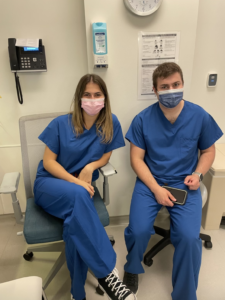Using AI to Treat Colon Cancer
Colonai, a new startup launched by two biomedical engineering alumni, wants to help doctors tackle one of the leading causes of cancer deaths
JAN 19 2022 KYLE BARR


Two enterprising biomedical engineers are developing an artificial intelligence vision system they say may help gastroenterologists fight back against one of the country’s leading causes of cancer death.
Close to 145,000 people were diagnosed with colorectal cancer, or CRC, in 2019. The National Cancer Institute has estimated that colorectal cancer accounts for nearly 9% of all cancer-related deaths in the country.
In fact, CRC is the second leading cause of death in the U.S., yet doctors also consider it one of the most preventable and treatable forms of cancer when caught early enough. Why the discrepancy? Because despite best efforts, nearly 27% of polyps are missed during colonoscopy.
Columbia biomedical engineering PhD candidate Jacob Nye ’18, ’20, ’26SEAS and Bina Bansinath ’24 GS, said the problem lies in how easily cancer polyps are missed by the naked eye and how even, when they’re treated, sometimes not all the cancer cells are removed. If the problem is human fallibility, advances in artificial intelligence may provide the answer.

“We’ve always been interested in utilizing our skills to solve a multitude of problems to help provide equitable, accessible and effective healthcare approaches,” Jacob Nye ’18, ’20, ’26SEAS
With the help of Columbia’s entrepreneurship programs, Colonai is on a steady march toward full realization. The pair took home the first place prize of $25,000 in the spring ‘21Startup Columbia entrepreneurship challenge In last fall’s inaugural Columbia-CareOne Healthcare Challenge, Colonai was in the top 24 entrepreneurial teams of the more than 100 who originally entered.
“We’ve always been interested in utilizing our skills to solve a multitude of problems to help provide equitable, accessible and effective healthcare approaches,” said Nye.
With the more than 19 million colonoscopies performed by physicians annually in the U.S., treating CRC hinges upon being able to spot tumors and deal with them early. It’s a disease that hits close to home for the team members. Bansinath said she herself, like millions of Americans, is at a high-risk for colon cancer.
“Over 95 percent of gastroenterologists we interviewed said they found a need for both of our solutions to improve the quality of their colonoscopies,” Bansinath said.
To keep up to date with Startup Columbia’s health care challenge, visit here. For more info on Colonai visit its website and LinkedIn page.
